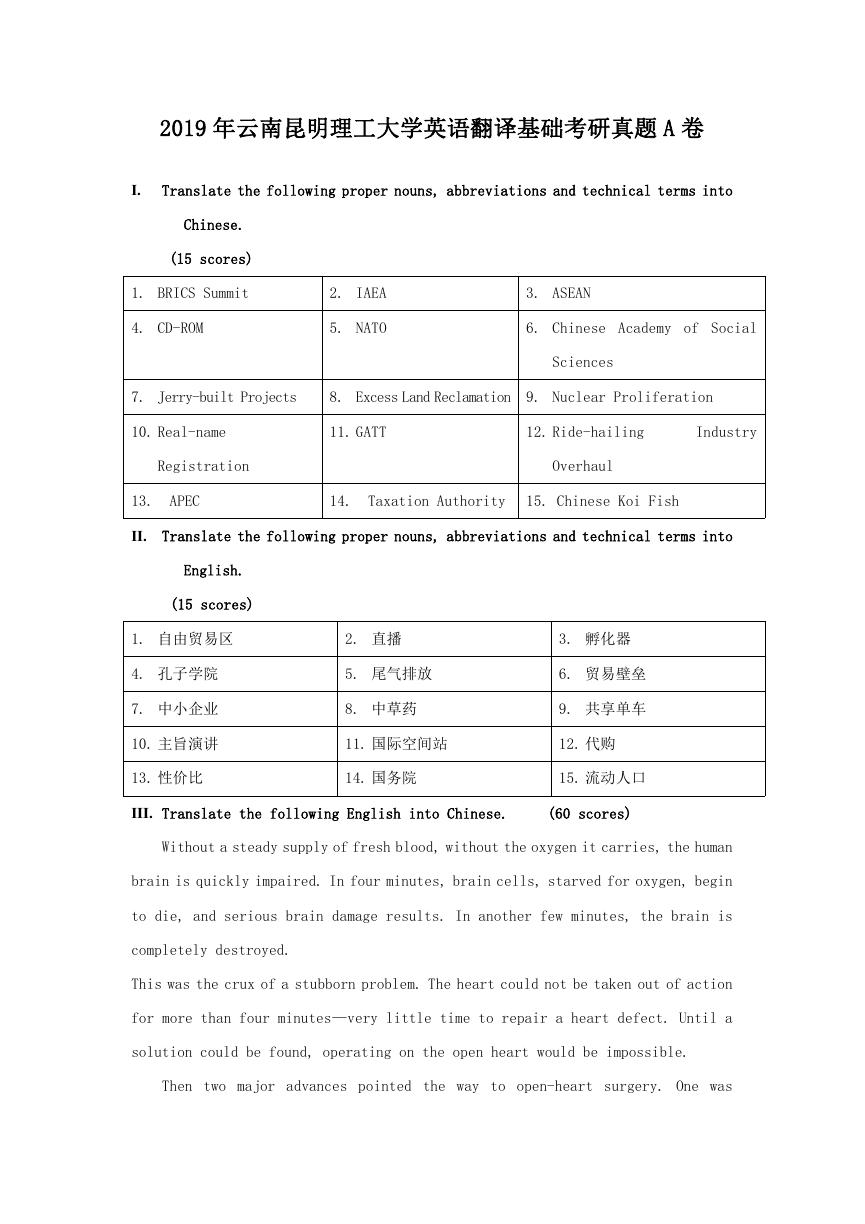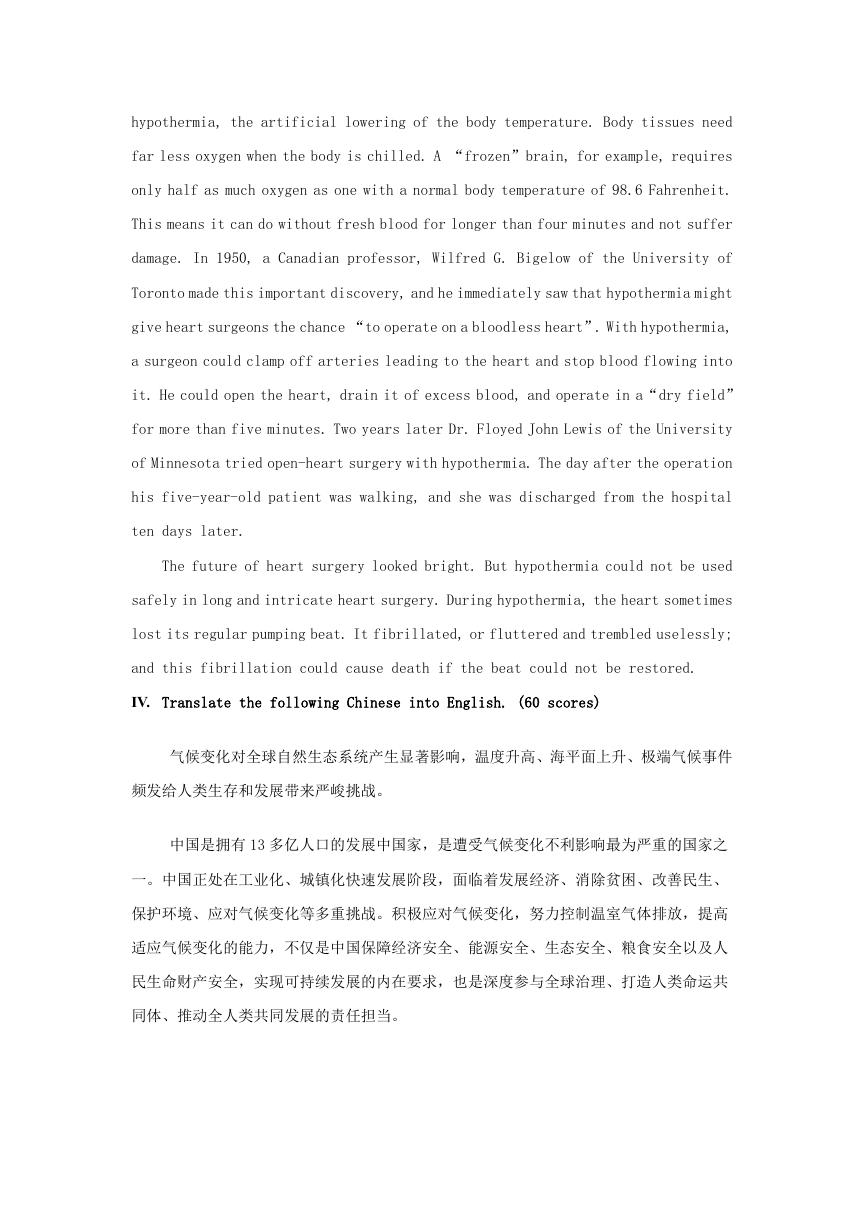2019 年云南昆明理工大学英语翻译基础考研真题 A 卷
I.
Translate the following proper nouns, abbreviations and technical terms into
Chinese.
(15 scores)
1. BRICS Summit
4. CD-ROM
2. IAEA
5. NATO
3. ASEAN
6. Chinese Academy of Social
Sciences
7. Jerry-built Projects
8. Excess Land Reclamation 9. Nuclear Proliferation
10. Real-name
11. GATT
12. Ride-hailing
Industry
Registration
Overhaul
13.
APEC
14.
Taxation Authority
15. Chinese Koi Fish
II. Translate the following proper nouns, abbreviations and technical terms into
English.
(15 scores)
1. 自由贸易区
2. 直播
4. 孔子学院
7. 中小企业
10. 主旨演讲
13. 性价比
5. 尾气排放
8. 中草药
3. 孵化器
6. 贸易壁垒
9. 共享单车
11. 国际空间站
12. 代购
14. 国务院
15. 流动人口
III. Translate the following English into Chinese.
(60 scores)
Without a steady supply of fresh blood, without the oxygen it carries, the human
brain is quickly impaired. In four minutes, brain cells, starved for oxygen, begin
to die, and serious brain damage results. In another few minutes, the brain is
completely destroyed.
This was the crux of a stubborn problem. The heart could not be taken out of action
for more than four minutes—very little time to repair a heart defect. Until a
solution could be found, operating on the open heart would be impossible.
Then two major advances pointed the way to open-heart surgery. One was
�
hypothermia, the artificial lowering of the body temperature. Body tissues need
far less oxygen when the body is chilled. A “frozen”brain, for example, requires
only half as much oxygen as one with a normal body temperature of 98.6 Fahrenheit.
This means it can do without fresh blood for longer than four minutes and not suffer
damage. In 1950, a Canadian professor, Wilfred G. Bigelow of the University of
Toronto made this important discovery, and he immediately saw that hypothermia might
give heart surgeons the chance “to operate on a bloodless heart”. With hypothermia,
a surgeon could clamp off arteries leading to the heart and stop blood flowing into
it. He could open the heart, drain it of excess blood, and operate in a“dry field”
for more than five minutes. Two years later Dr. Floyed John Lewis of the University
of Minnesota tried open-heart surgery with hypothermia. The day after the operation
his five-year-old patient was walking, and she was discharged from the hospital
ten days later.
The future of heart surgery looked bright. But hypothermia could not be used
safely in long and intricate heart surgery. During hypothermia, the heart sometimes
lost its regular pumping beat. It fibrillated, or fluttered and trembled uselessly;
and this fibrillation could cause death if the beat could not be restored.
IV. Translate the following Chinese into English. (60 scores)
气候变化对全球自然生态系统产生显著影响,温度升高、海平面上升、极端气候事件
频发给人类生存和发展带来严峻挑战。
中国是拥有 13 多亿人口的发展中国家,是遭受气候变化不利影响最为严重的国家之
一。中国正处在工业化、城镇化快速发展阶段,面临着发展经济、消除贫困、改善民生、
保护环境、应对气候变化等多重挑战。积极应对气候变化,努力控制温室气体排放,提高
适应气候变化的能力,不仅是中国保障经济安全、能源安全、生态安全、粮食安全以及人
民生命财产安全,实现可持续发展的内在要求,也是深度参与全球治理、打造人类命运共
同体、推动全人类共同发展的责任担当。
�




 2023年江西萍乡中考道德与法治真题及答案.doc
2023年江西萍乡中考道德与法治真题及答案.doc 2012年重庆南川中考生物真题及答案.doc
2012年重庆南川中考生物真题及答案.doc 2013年江西师范大学地理学综合及文艺理论基础考研真题.doc
2013年江西师范大学地理学综合及文艺理论基础考研真题.doc 2020年四川甘孜小升初语文真题及答案I卷.doc
2020年四川甘孜小升初语文真题及答案I卷.doc 2020年注册岩土工程师专业基础考试真题及答案.doc
2020年注册岩土工程师专业基础考试真题及答案.doc 2023-2024学年福建省厦门市九年级上学期数学月考试题及答案.doc
2023-2024学年福建省厦门市九年级上学期数学月考试题及答案.doc 2021-2022学年辽宁省沈阳市大东区九年级上学期语文期末试题及答案.doc
2021-2022学年辽宁省沈阳市大东区九年级上学期语文期末试题及答案.doc 2022-2023学年北京东城区初三第一学期物理期末试卷及答案.doc
2022-2023学年北京东城区初三第一学期物理期末试卷及答案.doc 2018上半年江西教师资格初中地理学科知识与教学能力真题及答案.doc
2018上半年江西教师资格初中地理学科知识与教学能力真题及答案.doc 2012年河北国家公务员申论考试真题及答案-省级.doc
2012年河北国家公务员申论考试真题及答案-省级.doc 2020-2021学年江苏省扬州市江都区邵樊片九年级上学期数学第一次质量检测试题及答案.doc
2020-2021学年江苏省扬州市江都区邵樊片九年级上学期数学第一次质量检测试题及答案.doc 2022下半年黑龙江教师资格证中学综合素质真题及答案.doc
2022下半年黑龙江教师资格证中学综合素质真题及答案.doc